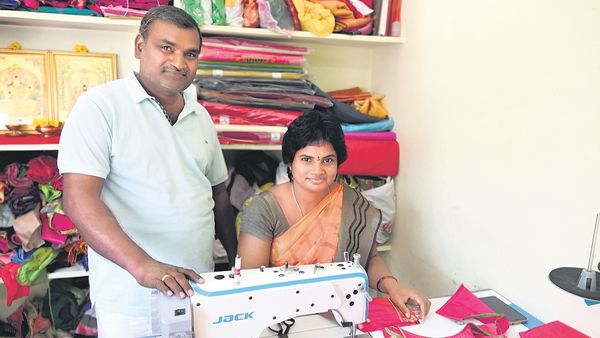Krishnavenni Kummari used to supplement her household income by sewing blouses on a machine at home. Tailoring had been a vocation in her husband K. Balaiah’s family and he taught her the skills to do it commercially, while he went off to Tbilisi in Russia to work as an electrician.
The pay was good in Tbilisi but minus 30-degree-Celsius temperatures froze his fingers. He decided to return and join his wife in the tailoring practice.
The micro-entrepreneurs found help in a Kakatiya Sandbox programme for social entrepreneurship in Nizamabad, founded by Silicon Valley angel investor Raju Reddy along with RedBus co-founder Phanindra Sama, both of whom hail from the city in Telangana.
Kakatiya staff helped the couple buy a Chinese Jack sewing machine which supports a larger scale operation. Today their Pavithra Ladies Tailor produces a range of embroidered garments and is a go-to supplier for local weddings. They have bought 10 Jack machines and train other tailors. They’re toying with a social commerce app like Meesho to start selling in other Tier-2 towns.
Both my sons are doing B.Tech. We want to grow our tailoring business and support their higher studies abroad,” says Krishnavenni.
This is a vignette from the Kakatiya Sandbox, which draws inspiration from the Deshpande Foundation Sandbox in Hubbali, Karnataka. Its Navodyami programme has helped thousands of micro-entrepreneurs—from tailors to jute bag and paper cup makers—with training as well as linkages to credit and markets.
A skill development programme equips students with the language, computing and social skills vital to their growth. Kakatiya took over a college that had shut down in Nizamabad to run a residential programme.
A partner organization, Better Cotton Initiative, is helping farmers in the region improve their practices and yields. Another partner is Nirmaan, founded in Raju Reddy’s alma mater BITS Pilani, which helps students with career guidance and counselling.
Tracking and coordinating the multiple programmes, partners and patrons is a local leadership team headed by rice mill owner Ravish Bhimani. One of the leaders is Veeresh Pani, a farmer’s son from Raichur district in Karnataka with a master’s degree in social work, who ended up cooking French fries and burgers at McDonald’s in Bengaluru, where he was a floor manager. A chance encounter with a college mate led him to the Deshpande Foundation, where he found his calling.
“I was nothing before that,” says Pani. “There are so many people like me in rural areas who can do much more with their lives if they get some guidance. I started thinking, ‘Why can’t I give back to society by impacting people like me?’ That’s how I joined the skill development programme.”
Five years ago, Shravya Reddy and her husband Ajit Narra, who were both working for multinational companies after graduating from BITS Pilani and IIT Bombay respectively, had a “mini-existential crisis”, as Narra puts it. After considering different options, they decided to come to Nizamabad and take over a school that Shravya Reddy’s mother was thinking of selling.
Today Presidency High School in Nizamabad is a model for grassroots innovation. Apart from modernizing processes, revamping the curriculum, and helping teachers change, the couple built a new campus with debt financing.
One of Shravya Reddy’s fears when she moved back to Nizamabad was that she would feel isolated after working in a company that took her to multiple countries. It receded when she got immersed in the school, but connecting with Kakatiya Sandbox and TIE, whose Nizamabad chapter launched last year, has opened new doors. “It’s nice to have mentors visiting our town from all over the world. We time our quarterly review meetings to coincide with Raju Reddy’s visits,” she says,
Having a great school is not enough,” adds Ajit Narra. “The local economy needs to transform and create opportunity. That’s why a programme like Kakatiya and links with TIE are so important. The business community here, which used to be self-absorbed, has opened up and started collaborating.”
Mounica Reddy went from Nizamabad to IIT Guwahati and works as a software development project lead for Oracle in Hyderabad. Most weekends she comes to Nizamabad to volunteer with Kakatiya. She too had an existential moment. “I got everything that I wanted, and then I asked myself, What is the meaning of life?’,” she says. “If one rephrases that question to ‘how can I add more meaning to my life’, then new avenues open up.”


